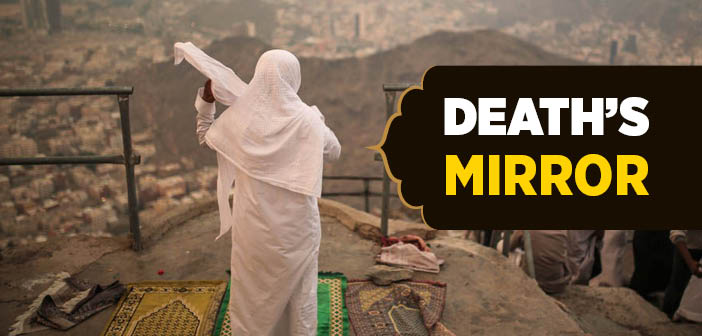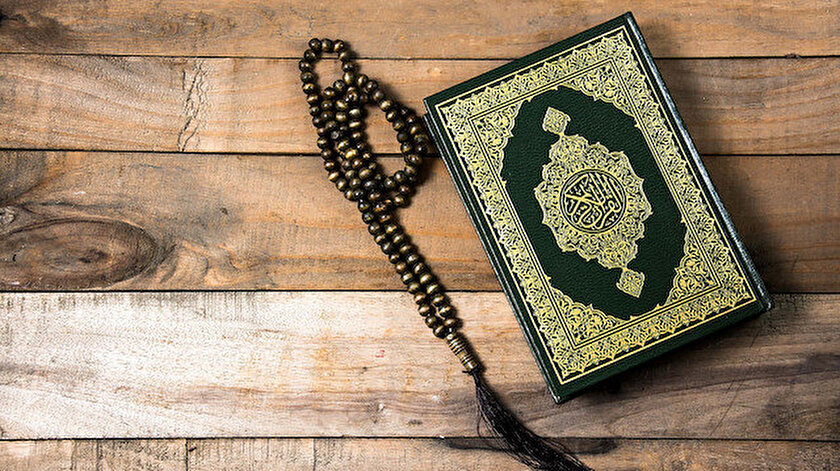What is the universal concern?
The Qur’anic chapter An-Naba’ opens with these verses:
“About what are they asking each other? About the momentous news: the thing about which they differ.” The News (An-Naba, 78:1-3)
It informs us of the disagreement of the unbelievers about the Last Day, the accounts concerning the Next Life and the existence of the Garden and the Fire. They are occupied with the questions: “what if the Garden and the Fire exist, what will happen to us in the Next World” This is the “momentous news” mentioned.
The age of ignorance, as is the case in today’s secular order, was a worldly life without any concern for the Next Life and without a consciousness of any ultimate accountability or reckoning. They did not have the slightest concern that they would one day be held to account for the persecution and injustice they perpetrated. This smoothed the ground for oppression and exploitation of the weak and for a brutality that exceeded even that of wild beasts. This is why the twisted order of the polytheists was shaken and their spirits dejected upon the Qur’an’s news of the Next Life.
The polytheists then came to the Messenger of Allah (may Allah bless him and grant him peace) telling him that they would accept his Prophethood and follow him in return for his abandoning the message of an afterlife and leaving alone their idols.
Those today who are disturbed by news of the afterlife, who do not remember death or worship their Lord and who pursue a life without any idea of ultimate accountability, remind us of the same attitude of the age of ignorance.
When a mosque is constructed in more affluent districts, for instance, property prices in these areas drop because the funeral prayers offered there remind those who lead a life of luxury of death. It is also interesting that when the Qur’anic verse, “Every self will taste death,” was hung at the entrance of the Zincirlikuyu Cemetery in Istanbul, many people complained that this message depressed them and they demanded its removal.
This illustrates the universal apprehension and dread that people, whether believers or not, have concerning life after death. Believers and unbelievers are troubled about death, the end of the world and the eternal life, only with a difference in focus.
The latter are concerned that the accounts of a Next Life are true: What if death is not eternal annihilation? What if there really will be a great Reckoning? This is a spiritual crisis that arises from an innate predisposition to the truth deeply embedded in every human being from the echoes of prior contract of their spirit.
In contrast, the concern of the believer is centred on the question of what their state in the afterlife will be and will their service be acceptable to their Lord.
The heart of the believer:
üIs filled with the fear of whether they will be able to surrender themselves as true believers.
üQuestions of whether or not they have attained a level of servanthood enabling them to be welcomed by the Angel of Death with a smile.
üWorries about answering the questions of the interrogating angels in the grave successfully.
üWorries whether their grave will be one of the meadows of the Garden or a pit of fire.
üWorries what their state will be when the Supreme Court is established, when their belief and actions are weighed on the scales, when their book of deeds, which contain all their actions great and small – is brought before them and when the final verdict on them is given.
Again, the believer thinks to himself:
In which hand will I receive the book of my deeds? Will it be from the front or from behind my back? What am I going to find in my Record, in which is kept the account of every moment of my life?
Indeed, I must take myself to account in this world, before I am taken to account in the next, but will my account here correspond with the one there?
Allah Almighty cautions us in this matter as follows:
“Whoever does an atom´s weight of good will see it. Whoever does an atom´s weight of evil will see it.” (Al-Zilzal, 99:7-8)
A Bedouin who heard these Qur’anic verses from the Messenger of Allah (may Allah bless him and grant him peace) asked in great astonishment:
“O Messenger of Allah, an atom’s weight?”
When the Messenger of Allah (may Allah bless him and grant him peace) replied in the affirmative, the Bedouin’s face changed immediately.
“What of my faults!” he began to lament, repeating these words over and over again. He then repeated the Qur’anic verses he had heard and then left.
The Messenger of Allah (may Allah bless him and grant him peace) said, “Belief has entered this man’s heart.” (Suyuti, al-Durr al-Manthur, VIII, 595)
Thus, contemplating the Day of Reckoning on which those shortcomings deemed trivial or unimportant in the world will be accounted for, and leading one’s life with such a concern, is the mark of true belief.
In this respect, a concern for the extent to which one’s deeds will weigh as good or evil on that sensitive scale is a preoccupation of a believing heart.
In another Qur’anic verse, Allah Almighty declares:
“Then you will be asked that Day about the pleasures you enjoyed.” (At-Takathur, 102:8)
When this verse was revealed, a companion who had no worldly possessions stood up and asked:
“Do I possess anything about which I will be questioned, O Messenger of Allah?”
The Messenger of Allah (may Allah bless him and grant him peace) said:
“The shade of a tree, the two sandals on your feet and the cold water you drink.” (See Suyuti, VIII, 619)
Thus, even a person who thought that he possessed no pleasures for which he would be questioned on the Day of Judgement, is regarded as accountable for these comforts he has been given.
We should bear in mind that the minimum amount of Zakat (obligatory charity) is clearly defined as one fortieth. We fulfil our duty that we are accountable for by payment of this amount. But Allah Almighty will not call people to account on the Day of Judgement just in regards to their wealth and possessions, but for all the imaginable blessings He has conferred upon them, such as their talents, abilities, health strength and free time and the minimum amount of these bounties is not clearly established.
Moreover, in accordance with the Qur’anic verse, “If you tried to number Allah’s blessings, you could never count them. Allah is Ever-Forgiving, Most Merciful.” (An-Nahl, 16:18). Who knows just how many blessings we have been favoured with – whether we are aware of them or not? Just as we are incapable of determining the exact amount of these favours, we are also incapable of fulfilling our debt of gratitude for them, no matter what we do.
Because the Prophet’s companions vividly felt the great weight of this responsibility, they gave their entire lives in service to Allah and His Messenger with an ever-increasing fervour and enthusiasm. They mobilised all the resources at their disposal and went all the way to China, Samarkand and to central Africa to convey the message of Islam ensuring they never grew weary or negligent.
Allah Almighty, declares in a Qur’anic verse:
“We will question those to whom the Messengers were sent, and We will question the Messengers.” (Al-A’raf, 7:6).
Even the Prophets and Messengers who were protected from any wrong action and guaranteed the Garden and led lives of self-sacrificing service, question whether or not they had duly fulfilled their mission of communicating the message.
The Messenger of Allah (may Allah bless him and grant him peace) endured all kinds of oppression and hardship in way of Allah attempting to call people to the truth. He had stones thrown at him and was subjected to relentless physical and verbal abuse but no matter the difficulty and risk, he did not refrain for a second from fulfilling his sacred mission of transmitting the message and demonstrated his tireless effort in this regard. Allah Almighty addressed him with the words:
“Perhaps you will destroy yourself with grief because they will not become believers.” (Ash-Shu’ara’, 26:3).
During his farewell address, he (may Allah bless him and grant him peace) asked his companions numbering more than one hundred thousand, three times:
“O People, you will be asked about me, what will you say? Have I conveyed the message?” to which his companions responded, “You have, O Messenger of Allah!”
He then said three times, “Be my witness O Lord, that I have conveyed your message to the people!”[1]
The Messenger’s great sense of responsibility constitutes very important guidance for his community.
Because of these truths, every believer should carry in the depths of his spirit a concern for the Last Day, strengthening their steadfastness and keeping the fire of belief burning brightly. With a heart th been illuminated through contemplation of death, they should strive to lead a vigilant life of servanthood.
Allah the Almighty reveals to us, in the person of His Messenger, the importance of constant remembrance of the Last Day and the Next Life and thus keeping ourselves in check:
“Has news of the Overwhelmer reached you?” (Al-Ghashiyya, 88:1)
That account has indeed come to us. But Allah Almighty, in a sense, offers warning to us:
“How is it that you can be so comfortable as though this news has never come to you?
How can you get caught up in the pursuit of vain ambition?
How can you waste away your life, your most precious capital?”
The verse below draws our attention to the form, on the Day of Rising, which the faces of those who spend their lives in distraction in this world and idle pursuit will take:
“Some faces on that Day will be downcast.” (Al-Ghashiyya, 88:2)
In contrast, the countenance of those righteous believers who are not deceived by this fleeting world and who go through life earning the rewards of the life to come are depicted as follows:
“Some faces on that Day will be radiant.” (Al-Ghashiyya, 88:8)
How then, in what state will we be on that Day?
We pay attention to our clothes and appearance in this world. What about our appearance and our faces in the Next World? What form will they take? Should we not be paying attention and showing more care to this?
What will our faces be like on that Day? A face that is covered in dust and dirt, dripping with blood and sweat, wretched, ugly and downcast? Or one that is beaming, radiant, shining with the mark of prostration – pure and glowing?
Allah draws attention to the fact that one’s character and inner condition in this world will be manifested on their face in the Next World:
“That Day some faces will be dust-covered, overcast with gloom. Those are the dissolute disbelievers.” (‘Abasa, 80:38-42).
What will our bodies be like on that Day? Will they be wretched bodies with limbs testifying against us, resurrected with the ugly marks of the bad things we did in the world, openly or in secret, overwhelmed by the burden of our own injustice? Or beautiful, pure, perfected bodies glowing in the parts that we used to wash for daily prayers, with our limbs fragrant and shining with the marks of our righteous deeds?
Let us not forget that what will determine our complexion and form in the Next Life is the spiritual state of our heart in this world. Hearts that are tarnished by the dark stain of wrong actions in this world will, in the world to come, cause the body to be resurrected in a repulsive state. Hearts that are purified in this world, however, and adorned with right actions, will – by the grace of Allah – be the means for being raised up blissful with a beautiful, radiant and smiling face.
Only those who are friends with Allah in the world are those who will be safe from fear and sorrow and who will have an easy passage across to the Next World. As is declared triumphantly in a Qur’anic verse:
“Yes, the friends of Allah will feel no fear and will know no sorrow.” (Yunus, 10:62)
And so, the sole purpose of life for the people of knowledge is to increase in friendship with their Lord and Master, Allah. May Allah Almighty enable us all to lead a life in accordance with His good pleasure and approval and to stand before Him with a sound and flawless heart. May He protect us from the trials of the grave and make our graves meadows of the Garden. May He include us among those friends who will have no fear and sorrow and who will be safe on the Day of Resurrection. May He make us neighbours of the Messenger of Allah (may Allah bless him and grant him peace) in the highest levels of the Garden Amin.
[1] See Muslim, Hajj, 147; Abu Dawud, Manasik, 56; Ibn Majah, Manasik, 76, 84; Ahmad, V, 30; Ibn Hisham, IV, 275-276; Hamidullah, al-Wasaik, p. 360.
Source: Osman Nuri Topbaş , Journey To Eternity, Erkam Publications





